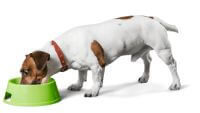When taking care of a dog, pet owners naturally concern themselves with ensuring proper nutrition for their furry friend. A common query is, “How many times a day should a dog eat?” This seemingly straightforward question leads to a broader discussion that encompasses the dog’s age, lifestyle, and even the quality and quantity of food provided.
It is important to understand that puppies, in their early life stages, require not only a balanced diet post-weaning but also a different feeding frequency compared to adult dogs. A pet’s diet extends beyond selecting the right dog food; it includes a feeding schedule established by the owner based on veterinary guidance.
Through regular check-ups, a veterinarian can offer tailored guidance on the optimal diet, taking into account the dog’s weight, size, and any health issues. The dog’s daily physical activity also plays a significant role in determining the necessary meal frequency.
In summary, determining how frequently to feed a dog involves a comprehensive evaluation of the animal’s quality of life, taking into account factors ranging from nutrition to integrating feeding into its daily routine, always prioritizing the pet’s well-being and health. Let’s delve deeper into this. Join us!

The Significance of a Balanced Diet for Dogs
The significance of a natural and balanced diet for dogs extends beyond satisfying hunger; it is a vital foundation for securing a long, healthy, and lively life for your pet. A balanced diet offers all essential nutrients required not only for growth and development but also for enhancing a robust immune system, supporting skin and coat health, and sustaining the proper functioning of the digestive and cardiovascular systems. Undoubtedly, diet plays a fundamental role in upholding your pet’s overall well-being.
How Your Pet’s Health and Well-being Are Affected by Diet

Moreover, proper nutrition is crucial for disease prevention, including chronic and obesity-related conditions, and plays a key role in managing existing health concerns. By carefully selecting foods and ensuring your dog receives a balanced diet tailored to its specific needs—considering age, size, and activity level—owners are directly contributing to their pet’s enhanced quality of life and well-being.
An imbalanced diet, characterized either by an excess or a deficiency of vital nutrients, can lead to issues such as obesity or malnutrition. These conditions are linked to a variety of health problems, including diabetes, heart disease, and reduced mobility.
Skin and Coat Health: The Impact of Diet
Diet plays a crucial role in the condition of a dog’s skin and coat. Dog food rich in omega-3 fatty acids contributes to healthier skin and a glossy coat, while an unbalanced diet can lead to skin issues and lackluster fur.

Digestive health is also impacted by what dogs eat. A feeding routine with sufficient fiber and probiotics supports gastrointestinal function, reducing the risk of constipation and diarrhea.
Nutrition is key for behavior too. A dog’s diet affects its behavior; lack of essential nutrients may cause irritability or lethargy.
A dog’s longevity and quality of life are closely tied to diet. A complete and balanced diet, containing necessary nutrients, vitamins, and minerals, not only extends a dog’s lifespan but also enhances its overall well-being. This holistic approach to nutrition lowers the chances of chronic illnesses and promotes better physical and mental health.
Knowing how many times a day should a dog eat and feeding dogs the right food at the right time is vital for their overall health and well-being. Establishing a regular feeding schedule helps most dogs maintain their ideal weight and energy levels. In addition, providing a complete and balanced diet tailored to an adult dog’s needs, based on their size, breed, and activity level, is essential for their health and vitality.
Dietary Differences: Puppies vs. Adult Dogs
The dietary variances between puppies and adult dogs are essential to guaranteeing healthy growth and sustaining the quality of life during their specific life stages. From birth to adulthood, a dog’s nutritional requirements undergo significant changes, necessitating adjustments by the owners.
Puppies, once they are weaned from their mother’s milk, require more calories per pound of body weight. The shift to solid food should be gradual. Their diet should be rich in nutrients to aid in bone, muscle, and cognitive development.

For puppies, the question often comes up: how many times should a dog eat in a day? Generally, puppies should eat three to four times a day to maintain their fast metabolism and provide a consistent energy supply.
As dogs mature into adults, the number of daily meals should adjust to twice a day, following a veterinarian’s recommendations. This reduction in feeding frequency helps maintain a healthy weight and prevents issues like obesity. An adult dog’s diet should be tailored to its size, weight, activity level, and specific health needs.
Identifying the Ideal Food Portion
Equally important to knowing how many times a day should a dog eat is understanding the correct amount of food for your pet. This varies depending on several factors such as age, weight, size, activity level, and health condition.
Establishing the right amount of food requires grasping these variables and adhering to the guidance and suggestions of a veterinarian.
Puppies have high nutritional needs to support their rapid growth. They are usually fed larger portions divided into more meals throughout the day, typically three to four times. As the dog grows older, meal frequency is often reduced to twice a day, with portion sizes adjusted to maintain a healthy weight and accommodate their activity level.
To maintain good nutrition for your dog, think about the proportion of each food type. For example, you could divide the food as follows: 30% carbohydrates, 30% lean meats, 30% vegetables, and 5% offal.
Calculating the Amount of Food for Your Dog

To calculate the daily amount of food to offer, use the following formula: (Dog’s weight) x (% recommended for the size) = total amount of food per day.
To assist with this somewhat complex task, we have made the Raw Dog Food Calculator available. Click here and use the calculator below to determine the amount of natural dog food your dog should receive daily!
A Feeding Schedule’s Significance
The importance of a feeding schedule for dogs lies in establishing a stable and predictable environment, crucial for the physical and emotional well-being of your adult dog. Setting specific meal times helps regulate how much food your adult dog eats, promoting effective digestion and nutrient absorption.
A regular feeding schedule also assists in preventing digestive issues like gastritis or pancreatitis, which may result from irregular feeding schedules or extended gaps between meals.
Behaviorally, having a feeding schedule gives adult dogs a daily routine, enhancing their sense of security and overall well-being. Dogs, similar to many animals, do well with predictability, which helps lower stress and anxiety levels. Anticipating the next mealtime can minimize undesirable behaviors like begging for food or scavenging.

For dog owners, having a clear feeding schedule streamlines daily planning, ensuring your adult dog’s dietary requirements are fulfilled without clashing with other household routines. Additionally, it facilitates better monitoring of your adult dog’s appetite, a crucial health indicator. Alterations in eating habits can indicate underlying health problems, necessitating veterinary care.
In terms of dog food, adult dog food, and how many meals dogs eat, creating a good feeding schedule is key for adult dogs’ health. Larger dogs, such as giant breed dogs or large breed dogs, may require more food, while small breed dogs or puppies eat smaller meals. For highly active dogs, more frequent feeding may be necessary to maintain their energy levels.
It’s important to leave food out for adult dogs in a controlled manner to prevent overeating and potential weight gain. Senior dogs, including senior large breed dogs, may need adjustments in their feeding schedule to account for health conditions and changes in their metabolism. By following a routine feeding times and ensuring your adult dog’s meals align with their ideal weight and caloric needs, you can promote healthy dogs and a good feeding schedule.
Final Thoughts

In conclusion, comprehending how many times a day should a dog eat and it dietary requirements and setting up a suitable feeding schedule are essential for fostering a long, healthy, and joyful life for your pet. The amount, quality of dog food, and consistency of meals, customized to the animal’s life stage, size, and activity level, are vital for the physical and emotional wellness of the dog.
Regular veterinary check-ups and a tailored approach to your dog’s specific requirements guarantee not only optimal nutrition but also enhance the connection between you and your furry friend. Keep in mind, by prioritizing your pet’s nutritional well-being, you’re investing in years of companionship, health, and mutual happiness.







